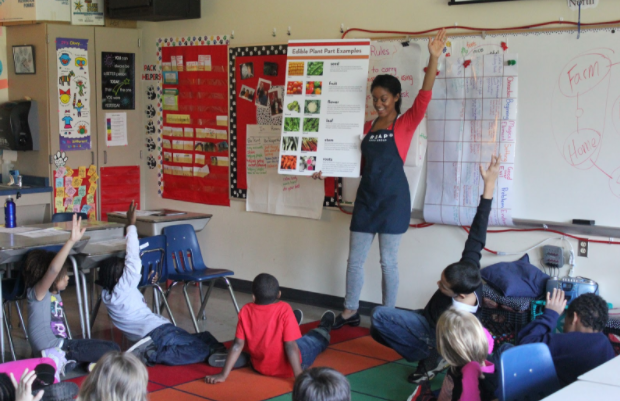






While vegetables have not always been a kid’s best friend, REAP is trying to change that by normalizing and exposing kids in the classroom.
Through the Farm to School program, the REAP Food Group brings fresh, local and sustainable foods directly to the Madison Metropolitan School District’s classrooms. Natasha Smith, the Farm to School program director, said for many students they would not have access or exposure to the fresh produce without the various programs.
According to Smith, one of the largest components is the snack program, where every week REAP sources a different vegetable or fruit to the 13 lowest income elementary schools in the school district. According to their website, REAP distributed over 180,000 snacks to over 5,500 students in 2015.
In addition to the students benefitting from the produce, Smith said the local farmers benefit as well. REAP sources from about 20 farms within 100 miles of Madison. For many of the farms, they feel good about selling their produce to the schools.
 Students at Leopold Elementary receive a lesson on plants as part of the REAP Farm to School Program. (Photo courtesy of Natasha Smith)
Students at Leopold Elementary receive a lesson on plants as part of the REAP Farm to School Program. (Photo courtesy of Natasha Smith)
“We want to support local sustainable small farmers in the community and provide them a market for their produce,” Smith said.
According to Smith many of the local farms have begun to rely on the program. To help the students understand where their food comes from, the farms send a “snack bite” alongside the food to provide information about the farmer or the health benefits.
“We also place a huge amount value on the educational piece, so teaching students where their food is coming from, where it’s grown,” Smith said.
For Smith, education is woven into everything REAP does both inside and outside of the classroom. Outside of the snack program, REAP has an education program where Americorps members will come to educate students on fresh produce, the local food system, the benefit to buying local food on the community and the ways they can eat healthy.
REAP also works with the cafeterias to bring fresh garden bars to lunches. Smith said they were working on a healthy cafeteria program to Lindbergh Elementary where they have a garden bar, the snack program and the educational component. REAP also is trying to implement a compost system and install a mural at the school.
Overall, Smith said students like the programs and that it is important to keep trying when it comes to getting students to eat fresh produce.
“If you go into their classroom and you’re really excited about it and you’re like ‘we’re going to hold up this kolorabi stick and take a crunch into it together,’” Smith said. “That’s really different than being like ‘Ah well, here’s a vegetable. I don’t know if you kids are going to like it.’”
During the first year of a snack program in a school, Smith said many students won’t eat a lot of the produce because it is new. However, in the schools who have had the programs for longer periods of time, it becomes normal.
Smith said the positive feedback from teachers and parents is really exciting.
“There are some students who will come up and ask for the extra snack that’s left at the end of the day,” Smith said.
|
|
|
Welcome to the Madison Commons, a website designed to provide news and information about all of Madison's neighborhoods and a crossroads for the discussion of community issues. The name comes from the idea of a village commons, a place for news, talk, debate, and some entertainment, too, that's open to everyone.
All rights reserved. Read more about the Madison Commons and its partners.

